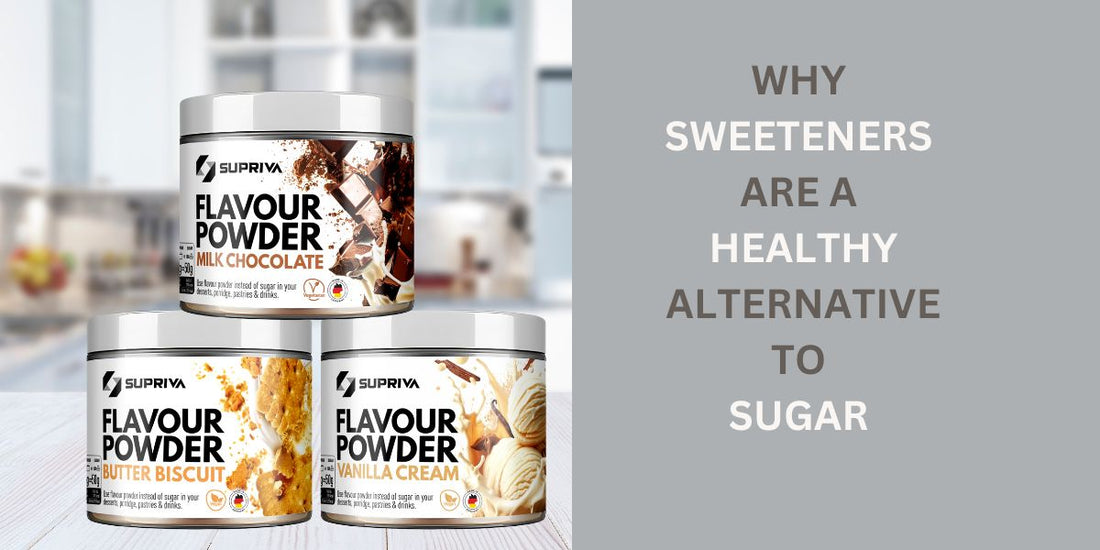
Why Sweeteners Are a Healthy Alternative to Sugar – and How SUPRIVA Flavour Powder Helps You Cut Calories
Share
In recent years, sugar has gained notoriety for its harmful health effects. It’s often linked to obesity, Type 2 diabetes, and cardiovascular disease. With growing concerns, many are turning to sugar alternatives—and sweeteners have emerged as a popular choice. Despite lingering doubts about their safety, the latest scientific research confirms that sweeteners are safe and effective for reducing calorie intake without sacrificing the sweet taste we all love.
SUPRIVA Flavour Powder offers a nearly calorie-free solution to help you reduce sugar in your diet, while still indulging in your favorite flavors.

SHOP NOW >>>
The Different Types of Sweeteners
Sweeteners can be categorized into artificial and natural sweeteners, both of which have been deemed safe for consumption by health authorities like the EFSA (European Food Safety Authority) and FDA (U.S. Food and Drug Administration).
1. Artificial Sweeteners
Common artificial sweeteners include Aspartame, Sucralose, and Acesulfame-K. These sweeteners are hundreds of times sweeter than sugar, allowing for much smaller amounts to deliver the same level of sweetness—resulting in significantly fewer calories. They also don’t raise blood sugar levels, making them a great choice for people with diabetes.
A comprehensive 2021 review published in the British Medical Journal found no conclusive evidence of harm from consuming approved artificial sweeteners over time. Moreover, Sucralose is heat-resistant, which makes it ideal for baking and cooking.
2. Natural Sweeteners
Popular natural sweeteners include Stevia and Erythritol. Stevia is up to 300 times sweeter than sugar and has no calories. Erythritol, a sugar alcohol, contains minimal calories (about 0.2 kcal per gram) and doesn’t affect blood sugar levels. Studies show that natural sweeteners are just as safe as artificial options.
However, many users report an unpleasant aftertaste—Stevia often tastes bitter or like licorice, while Erythritol can leave a cooling sensation in the mouth. These taste quirks can deter people from using sweeteners, despite their low-calorie and health-friendly benefits.
SUPRIVA Flavour Powder: The Perfect Sweetener Without the Aftertaste
SUPRIVA Flavour Powder eliminates the issue of aftertaste, providing a smooth, natural sweetness without the bitterness or cooling effects associated with other sweeteners. Whether in desserts, drinks, or baked goods, SUPRIVA blends seamlessly into any recipe, delivering sweetness without a chemical or licorice-like flavor.
SUPRIVA Flavour Powder is available in a variety of delicious flavors—vanilla, chocolate, and more—allowing you to sweeten your favorite treats without the extra calories. Plus, it’s heat-resistant, making it an excellent option for healthy baking.
Myth: Sweeteners Cause Weight Gain or Health Issues
A common misconception is that sweeteners contribute to weight gain or health problems like cancer. These claims are often based on misinterpretations of studies or animal research. However, a 2022 meta-analysis published in the International Journal of Obesity found that people who use sweeteners consume fewer calories and gain less weight than those who use sugar.
Similarly, long-term studies show no significant link between sweetener use and cancer in humans. Instead, sweeteners can be a powerful tool for weight management when combined with a calorie-controlled diet.
SUPRIVA Flavour Powder helps you reduce calorie intake without giving up the sweet flavors you love—ideal for those looking to maintain or lose weight.
The Benefits of Reducing Calories with Sweeteners
Switching to low-calorie sweeteners like SUPRIVA Flavour Powder offers numerous benefits, especially for those trying to manage their body weight. Unlike sugar, which can contribute to fat storage if not burned, sweeteners provide little to no calories, allowing you to enjoy sweet flavors without the extra energy intake.
Research shows that replacing sugar with sweeteners doesn’t lead to increased calorie consumption later. With SUPRIVA, you can drastically cut your daily sugar and calorie intake while still enjoying your favorite flavors in beverages, desserts, and more.

SHOP NOW >>>
Conclusion: Sweeteners Are Safe and Effective for Cutting Calories
The scientific evidence is clear: approved sweeteners are a safe and healthier alternative to sugar, especially for those aiming to reduce their calorie intake or lower their risk of conditions like diabetes. Sweeteners help maintain stable blood sugar levels and reduce overall calorie consumption, which is key for weight loss or management.
SUPRIVA Flavour Powder offers a simple, delicious way to save calories without sacrificing flavor. It’s the perfect addition to any balanced diet that focuses on cutting out unnecessary sugar.
Enjoy the sweet taste of health with SUPRIVA Flavour Powder today!
---------------
Sources
- Toews, I., Lohner, S., Küllenberg de Gaudry, D., Sommer, H., & Meerpohl, J. J. (2019). Association between intake of non-sugar sweeteners and health outcomes: systematic review and meta-analyses of randomised and non-randomised controlled trials and observational studies. BMJ, 364, k4718.
- Rogers, P. J., Hogenkamp, P. S., de Graaf, C., Higgs, S., Lluch, A., Ness, A. R., ... & Mela, D. J. (2016). Does low-energy sweetener consumption affect energy intake and body weight? A systematic review, including meta-analyses, of the evidence from human and animal studies. International Journal of Obesity, 40(3), 381-394.
- Magnuson, B. A., Carakostas, M. C., Moore, N. H., Renwick, A. G., & Alan R. S. (2016). Aspartame: A safety evaluation based on current use levels, regulations, and toxicological and epidemiological studies. Critical Reviews in Toxicology, 47(9), 740-763.
- Rogers, P. J., Hogenkamp, P. S., de Graaf, C., Higgs, S., Lluch, A., Ness, A. R., ... & Mela, D. J. (2016). Does low-energy sweetener consumption affect energy intake and body weight? A systematic review, including meta-analyses, of the evidence from human and animal studies. International Journal of Obesity, 40(3), 381-394.
- Magnuson, B. A., Carakostas, M. C., Moore, N. H., Renwick, A. G., & Alan R. S. (2016). Aspartame: A safety evaluation based on current use levels, regulations, and toxicological and epidemiological studies. Critical Reviews in Toxicology, 47(9), 740-763.
- Pepino, M. Y. (2015). Metabolic effects of non-nutritive sweeteners. Physiology & Behavior, 152, 450-455.
